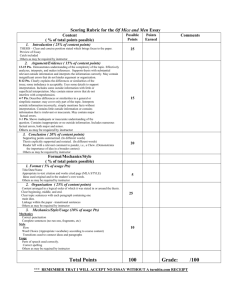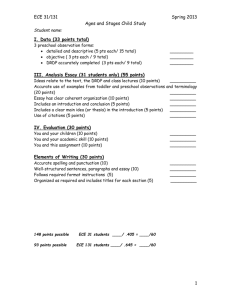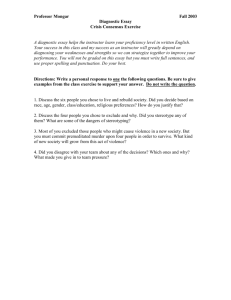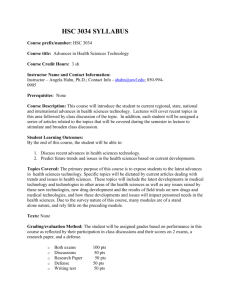stc syllabus - Juan Diego Academy
advertisement
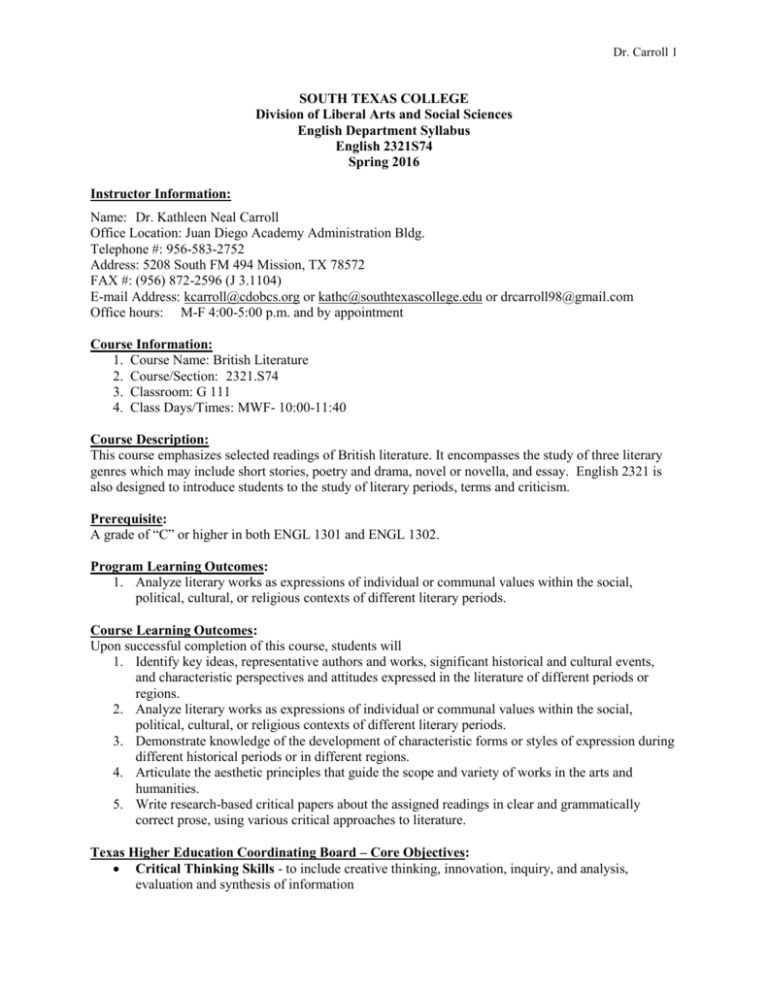
Dr. Carroll 1 SOUTH TEXAS COLLEGE Division of Liberal Arts and Social Sciences English Department Syllabus English 2321S74 Spring 2016 Instructor Information: Name: Dr. Kathleen Neal Carroll Office Location: Juan Diego Academy Administration Bldg. Telephone #: 956-583-2752 Address: 5208 South FM 494 Mission, TX 78572 FAX #: (956) 872-2596 (J 3.1104) E-mail Address: kcarroll@cdobcs.org or kathc@southtexascollege.edu or drcarroll98@gmail.com Office hours: M-F 4:00-5:00 p.m. and by appointment Course Information: 1. Course Name: British Literature 2. Course/Section: 2321.S74 3. Classroom: G 111 4. Class Days/Times: MWF- 10:00-11:40 Course Description: This course emphasizes selected readings of British literature. It encompasses the study of three literary genres which may include short stories, poetry and drama, novel or novella, and essay. English 2321 is also designed to introduce students to the study of literary periods, terms and criticism. Prerequisite: A grade of “C” or higher in both ENGL 1301 and ENGL 1302. Program Learning Outcomes: 1. Analyze literary works as expressions of individual or communal values within the social, political, cultural, or religious contexts of different literary periods. Course Learning Outcomes: Upon successful completion of this course, students will 1. Identify key ideas, representative authors and works, significant historical and cultural events, and characteristic perspectives and attitudes expressed in the literature of different periods or regions. 2. Analyze literary works as expressions of individual or communal values within the social, political, cultural, or religious contexts of different literary periods. 3. Demonstrate knowledge of the development of characteristic forms or styles of expression during different historical periods or in different regions. 4. Articulate the aesthetic principles that guide the scope and variety of works in the arts and humanities. 5. Write research-based critical papers about the assigned readings in clear and grammatically correct prose, using various critical approaches to literature. Texas Higher Education Coordinating Board – Core Objectives: Critical Thinking Skills - to include creative thinking, innovation, inquiry, and analysis, evaluation and synthesis of information Dr. Carroll 2 Communication Skills - to include effective development, interpretation and expression of ideas through written, oral and visual communication Personal Responsibility - to include the ability to connect choices, actions and consequences to ethical decision-making Social Responsibility - to include intercultural competence, knowledge of civic responsibility, and the ability to engage effectively in regional, national, and global communities Course Learning Outcome Identify key ideas, representative authors and works, significant historical and cultural events, and characteristic perspectives and attitudes expressed in the literature of different periods or regions. Analyze literary works as expressions of individual or communal values within the social, political, cultural, or religious contexts of different literary periods. Demonstrate knowledge of the development of characteristic forms or styles of expression during different historical periods or in different regions. Articulate the aesthetic principles that guide the scope and variety of works in the arts and humanities. Write research-based critical papers about the assigned readings in clear and grammatically correct prose, using various critical approaches to literature. THECB Core Objective (Instructor Assigned) Critical Thinking Skills Social Responsibility Assessment (Instructor Assigned) Quizzes over poetry and Unit Exam Poetry Unit Exam Critical Thinking Skills Communication Skills Personal Responsibility Social Responsibility Sense and Sensibility Project Discussion Board responses Paper 1 Project Romantic Period Essay Paper 2 Critical Thinking Skills Communication Skills Collaborative Project Midterm Exam Critical Thinking Skills Short Essays Discussion Threads Critical Thinking Skills Communication Skills Social Responsibility \Research Paper Paper 2 and Paper 4 Dr. Carroll 3 Course Requirements, Evaluation Methods, and Grading Criteria: Grading System Activity Points for each Points Possible Meetings 5 meetings during semester 100 Intro Thread 10 points 10 Essay 1 (project) 50 pts. 50 Essay 2 (research) 50 (10 pts. peer editing and outline) Quizzes 10 pts. each 50 40 50 pts. for objective; Midterm 100 50 pts. for short essays Discussion Board 10 pts. X 5 posts 50 Essay # 3 50 pts. 50 Essay # 4 50 pts. 50 500 total points possible A FINAL GRADE 450-500 PTS B 400-449 PTS. C 350-399 PTS. D 300-349 PTS. F 299 OR LESS Dr. Carroll 4 English 2321S74 Dual-Credit Timeline 2016 Weeks 1-3 Orientation: Syllabus; Middle Ages (to ca. 1485) & 16 th Century (1485-1603); Essay (Exam) 1 The Dream of the Rood Beowulf The Canterbury Tales The Vision of Piers Plowman Utopia (Please purchase) Speech to the Troops at Tilbury Weeks 4-6 16th Century (1485-1603) & Early 17th Century (1603-1660); Essay (Exam) 2 The Faerie Queene Doctor Faustus Twelfth Night From Leviathan Paradise Lost Weeks 7-9 Restoration and the 18th Century (1660-1785) & Romantic Period (1785-1830) Paradise Lost (continued) From Gulliver’s Travels The Rape of the Lock From The Dunciad The Vanity of Human Wishes The Rights of Woman There Is No Natural Religion Weeks 10-12 Romantic Period (1785-1830): Essay (Exam) 3 The Marriage of Heaven and Hell From A Defence of Poetry David Copperfield (Please Purchase) Weeks 13-15 Victorian Age (1830-1901); Debate David Copperfield (ongoing) Preface to The Picture of Dorian Gray The Importance of Being Earnest Weeks 16-18 Twentieth Century and After; Essay (Exam) 4 Heart of Darkness (Please Purchase) Translations The Portrait of an Artist as a Young Man (Please Purchase) Dr. Carroll 5 Meetings, Appointments, and Chat Meeting Points (required): You will earn five points for scheduling and keeping a face-to-face conference (when I'm available after school for tutoring) You will need to email me with three prospective times Please set this up EARLY in the semester. Discussion Board will be available for continued dialog outside of class. Be professional on the discussion board and use appropriate language. Attendance/Class Participation and Course Policies Regular and punctual class attendance is expected of all students. If attendance or compliance with other course policies is unsatisfactory, the instructor may withdraw students from the dual enrollment portion of the class. CENSUS DAY is FEBRUARY 3rd. Withdrawal Policy It is the responsibility of each student to ensure that his or her name is removed from the roll should he or she decide to withdraw from the class. The instructor does, however, reserve the right to drop a student should he or she feel it is necessary. If a student decides to withdraw, he or she should also verify that the withdrawal is submitted before the Final Withdrawal Date. April 19th is the Spring withdrawal date and the counselors should be given the information prior to the date since the withdrawal form must be at STC by April 19th. The student is also strongly encouraged to retain their copy of the withdrawal form for their records. . Incompletes An instructor may award a grade of “I” (Incomplete) if a student was unable to complete all of the objectives for the passing grade in a course. An incomplete grade cannot be carried beyond the established date in the following semester. The completion date is determined by the instructor but may not be later than the final deadline for withdrawal in the subsequent semester. Except in very rare situations, I do not give incompletes. You must be currently passing the class at the time of your request. I will review each case to determine whether I feel an incomplete is warranted or not. In general, however, barring extraordinary circumstances, and unless you have completed 75% of the coursework on time, I will not grant you an incomplete. Dr. Carroll 6 MISSED OR LATE WORK NO LATE WORK! IF YOU ARE ABSENT, SUBMIT WORK DUE ONLINE. Statement on Scholastic Dishonesty A student attending STC assumes responsibility for conduct compatible with the mission of the college as an educational institution. Students have the responsibility to submit coursework that is the result of their own thought, research, or self-expression. Students must follow all instructions given by faculty or designated college representatives when taking examinations, placement assessments, tests, quizzes, and evaluations. Actions constituting scholastic dishonesty include, but are not limited to, plagiarism, cheating, fabrication, collusion, and falsifying documents. Penalties for scholastic dishonesty will depend upon the nature of the violation and may range from lowering a grade on one assignment to an “F” in the course and/or expulsion from the college. Any student who commits an act of scholastic dishonesty will be subject to disciplinary action which may include receiving an F in the course. If you write a paper or work on an assignment with a clear intent to cheat, disciplinary action WILL BE taken. In general, cheating includes plagiarism from another source such as the Internet; copying from another student is a form of plagiarism. When it comes to cheating, I have a no-tolerance approach. Papers will be submitted to Safe Assign for review so all papers must be turned in electronically, and by hard copy. Student Rights and Responsibilities Students at the college have the rights accorded by the U.S. Constitution to freedom of speech, peaceful assembly, petition, and association. These rights carry with them the responsibility to accord the same rights to others in the college community and not to interfere with or disrupt the educational process. Opportunity for students to examine and question pertinent data and assumptions of a given discipline, guided by the evidence of scholarly research, is appropriate in a learning environment. This concept is accompanied by an equally demanding concept of responsibility on the part of the student. As willing partners in learning, students must comply with college rules and procedures. Statement on Students with Disabilities Each STC campus offers support services for students with documented disabilities. Students with disabilities who need classroom, academic or other accommodations must request them Dr. Carroll 7 through the Office for Students with Disabilities (OSD). Students are encouraged to request accommodations when they register for courses or at least three weeks before the start of the semester, otherwise the provision of accommodations may be delayed. Students who have received approval for accommodations from OSD for this course must provide the instructor with the "Notice of Approved Accommodations" from OSD before accommodations will be provided. Arrangements for academic accommodations can only be made after the instructor receives the „Notice of Approved Accommodations‟ from the student. Students with approved accommodations are encouraged to submit the "Notice of Approved Accommodations" to the instructor at the beginning of the semester because a reasonable amount of time may be needed to prepare and arrange for the accommodations. Safety Statement South Texas College is committed to providing a safe and healthy environment for study and work. You are expected to learn and comply with STC environmental, health and safety procedures and agree to follow STC safety policies. Because some health and safety circumstances are beyond our control, we ask that you become familiar with the Emergency Procedures poster and Campus Safety Plan map in each classroom. Please note, you are expected to conduct yourself professionally with respect and courtesy to all. Anyone who thoughtlessly or intentionally jeopardizes the health or safety of another individual will be immediately dismissed from the day‟s activity, may be withdrawn from the class, and/or barred from attending future activities. .GROUP WORK Everyone in this class will be required to peer edit papers. Please read the Minor Assignments Guide for more information. See Paper Guidelines for information about completing the final paper as a group project (optional). Please limit yourself to emailing me no more than once a day and no more than three times a week. My preferred form of communication is via Blackboard email. Please proofread all papers, emails, discussion posts, etc. for spelling, punctuation, and grammar prior to submission. During this course, I expect everyone to communicate with dignity and respect. If you harass me or other students, you will be asked to withdraw from my course. Email is one of my favorite forms of communication. However, please do not send jokes, religious anecdotes, virus scares, political propaganda, solicitation, etc. to me or other class members, and I will try to do the same. Dr. Carroll 8 In the discussion boards and chat rooms, the objective is to be collaborative, not combative. Remember, even an innocent remark online can be misconstrued. Therefore, proofread the content and tone of your responses carefully before you post them. * I expect you to relate your posts to the readings and lectures. * I expect you to document information derived from another source. * I expect you to conduct dynamic, lively, and interactive discussions. * I expect you to use critical thinking to explore the topics of our discussions. * I expect your online tone to be respectful and professional. * I expect you not to incite others-- including your teacher.
